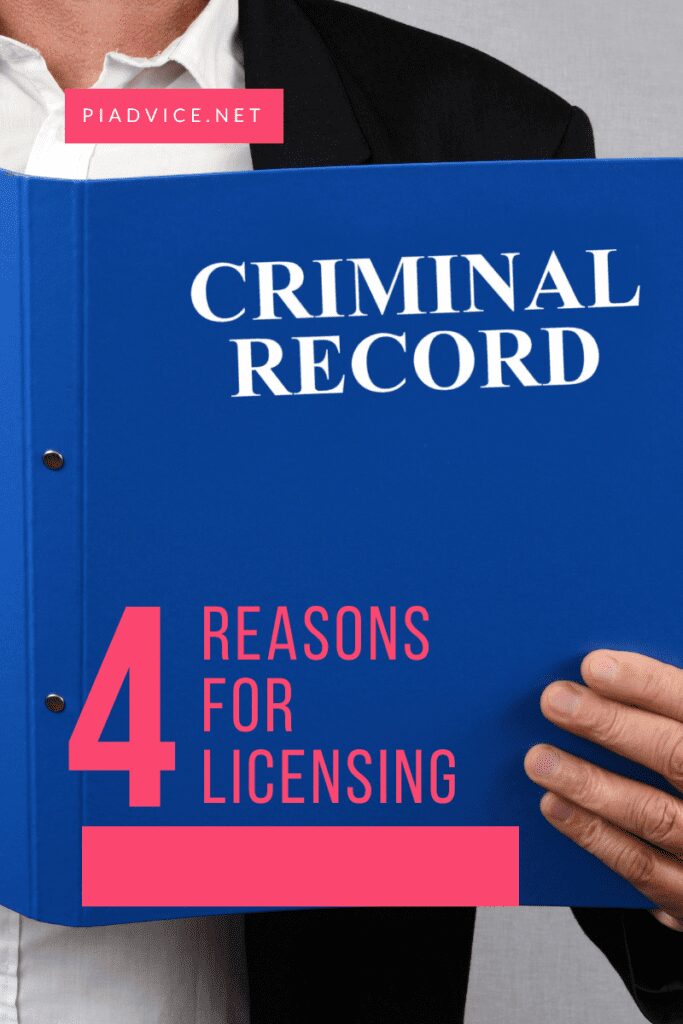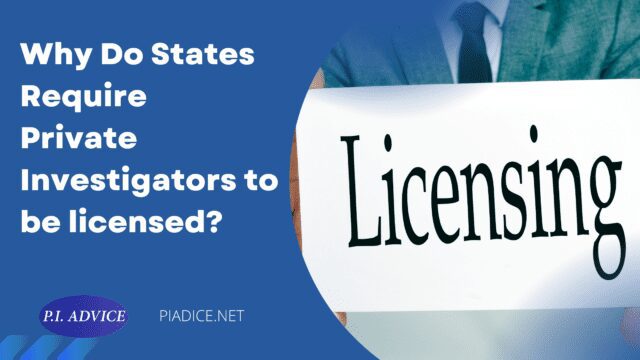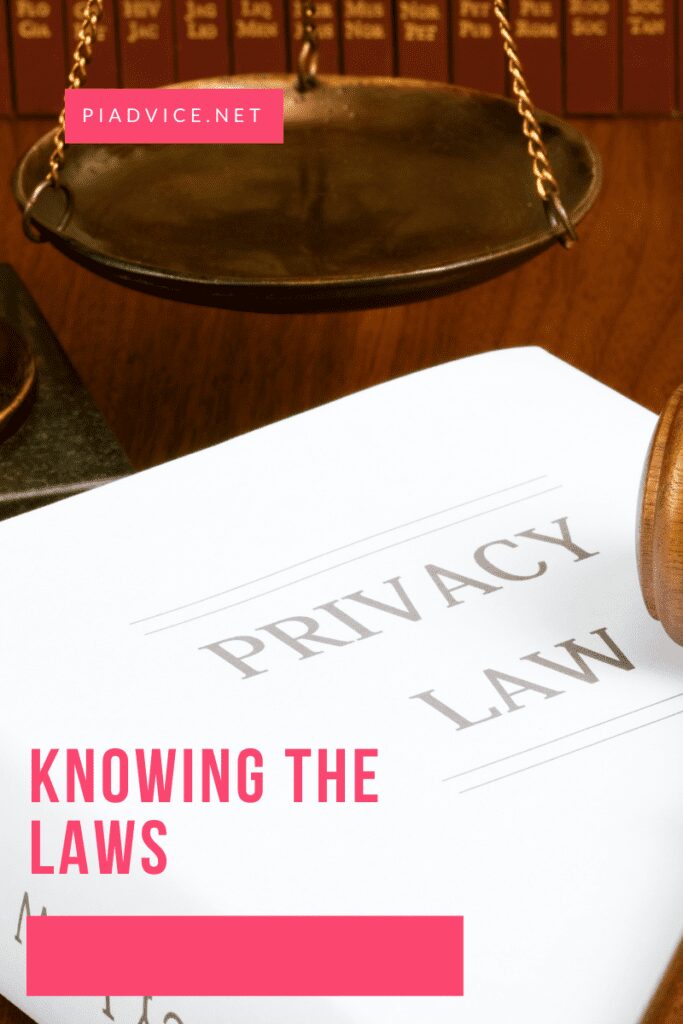There are many reasons states require private investigators to be licensed. Nearly all of the states in the United States require a private investigator to be licensed if they are soliciting work. The exception to this is if someone is working under the license of a company. In those cases, they aren’t really soliciting the work or taking on any liability per se. They are however working on the assignments. The investigation agencies are responsible for training the investigators and more or less making sure they are not breaking laws while working on behalf of the investigation agency.
The states that don’t currently require a private investigation business to be licensed through their state are:
- Alaska
- Idaho
- Mississippi
- South Dakota
- Wyoming
- Colorado (no licensing as of August 2021) History of it here
Some of these states may require licensing in cities within the state.

General Requirements to Secure an Agency License
Generally speaking (because all states require different things) someone who wants to open their own private investigation agency usually will have to be 21 years of age with no criminal record. They will have to have a specific amount of transferable experience or a specific amount of experience working for an investigation company. Or in place of experience, some states allow for a degree to account for some of that experience that is required. And some states will allow for a test to be taken instead of experience.
In some states, it can be extremely hard to acquire your agency (investigation business) license while some might not be quite as hard.
Washington State had a few different ways one could obtain an agency license. One way was by paying a fee to take a test. If a person passed that test, they could secure their agency license. The other way was based on trackable experience.
Here are some of the major reasons states require private investigators to be licensed.
To Protect the Public
A state requires private investigation companies and investigators to be licensed in an attempt to protect the public from negligent individuals. If a private investigator breaks the law or takes a deposit and does not fulfill their duties, the state can take away their license and prevent them or the company from legally performing investigative work.
With that being said, I personally don’t know any investigators that have been penalized or have lost their business or agency license ever. I am not saying it doesn’t happen, I just haven’t come across any situations or heard of situations where it has occurred. I also was lucky to have investigators around me with high integrity and work ethic so that may have been the reason for that.
To Prevent Criminals from Performing Investigative Work
As far as I know, states that require investigators to be licensed through the state do not allow felons to perform investigative work. Potential private investigators are required to pass a background check as well.
There is good reason for background checks of future investigators, as a licensed private investigator will have access to databases that only certain people are able to have access to help locate and find people. It would not be a good idea to have criminals have access to information that could be used for harm.

To Insure Investigators have an Understanding of Laws and Privacy
To start my own private investigation agency in Washington state I had to have several verifiable years of experience to present to the licensing agency (which I did have). And before I pursued my own investigation agency license I was licensed under a company. To be licensed under another company I also had to attend a seminar with certified training in Washington state.
Another example would be in Oregon. In Oregon, to be licensed under a company, one must attend a seminar and pass a test that mainly involved laws that an investigator should be aware of.
On the note of privacy and laws, I spoke with an investigator recently about something unrelated to privacy (at least at the beginning of the conversation). He was former military and had some law enforcement experience if I remember correctly and he told me how he had worked an infidelity assignment. He shared that to get the video of the infidelity he had to videotape it through the home window. I was like, “You can’t do that, my friend”. That is like basic private investigation knowledge 101. And he said something to the effect that the was going to give it to the attorney and let them decide if they could use it. It was this ignorance that a licensing department will hope is avoided in the investigation industry through licensing though it won’t stop it completely.
To Insure Compententcy and Some Experience
As I mentioned earlier, many states require some sort of previous comparable experience. I can imagine this is in place in hope of eliminating some issues with privacy-violating, unintentional lawbreaking and having an investigator have some understanding of the job itself.
Some states require continuing education credits for an investigator to maintain their license as well.
Private Investigator laws are extremely important for an investigator to have some idea about when in the field. Ignorance about laws is not innocence. The investigation company I was hired to work for knew the importance of laws and privacy so much that it was one of the first things they taught us. Pretexting Laws are something I have written about in the past if you would like to learn more about it.
Personal Thoughts on Private Investigator Licensing
From a logical point, I completely understand why age requirements, previous experience, knowledge of laws, and a clean criminal record would be important for a state to require before allowing someone to open their own private investigation agency.
It’s like hiring a real estate agent and knowing that they have some governing body making sure criminals don’t have access to homes by calling themselves, real estate agents. Now not all real estate agents are created equal and not all private investigators are created equal. Even with passing tests and having “previous experience”, or working in the industry for 40 years, it doesn’t mean they are actually good at what they do.
Colorado was one state that didn’t require a private investigator to be licensed years ago. I still remember keeping tabs on the state when they began making headway on getting a licensing program started. What was interesting is they got their foot in the door by making licensing voluntary. The state was apparently losing money with the voluntary licensing program and then they later made it mandatory. After doing some reading the program was able to pay back all the lost money when it became mandatory.
Now I don’t have a problem with licensing in general. Like I said above, I think there are some really good things that come from it. But the licensing that was being proposed in Colorado was a tiered system. There were two different levels of licensing depending on how long you had been in business. That is something that I did not agree with. It would be like having different tiers for real estate agents. “You don’t want an agent that has only been doing it for a month or a year right?” Basically, my impression and opinion were that they set the licensing structure up to take care of the people in the state that already had experience.
I remember publically being disappointed in what I was hearing and I was told by some folks in Colorado at that time to mind my own business as I didn’t live in Colorado. Ironic how 6 years later, I live in Colorado.
Fast forward to today, it was determined by the state of Colorado that there was not enough evidence that the licensing program actually (and I am paraphrasing here) did anything to protect the public. Like there wasn’t enough evidence that licensing actually made a difference in the state. So as of August 2021, there doesn’t appear to be a private investigation licensing requirement in Colorado.
Here is something I learned through this experience. Be interested in other states and their licensing programs as many investigators get licensed in multiple states. That state licensing program may affect you in the future. I didn’t know that I would be moving to Colorado when I had my dissenting opinion about the type of licensing they were pursuing in Colorado. In 2019 I moved to Colorado and it is truly a wonderful state. My family and I are blessed to be here.



